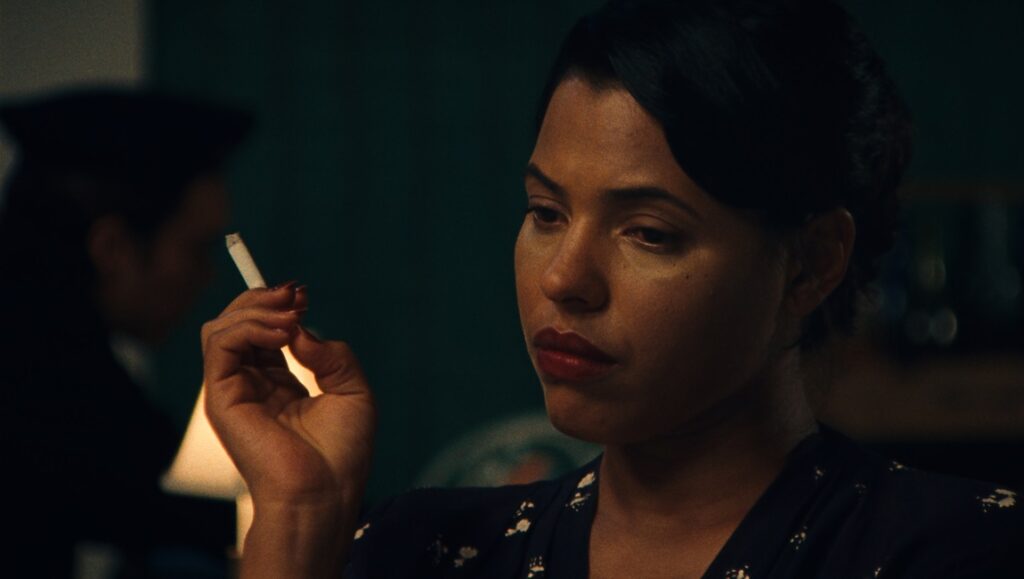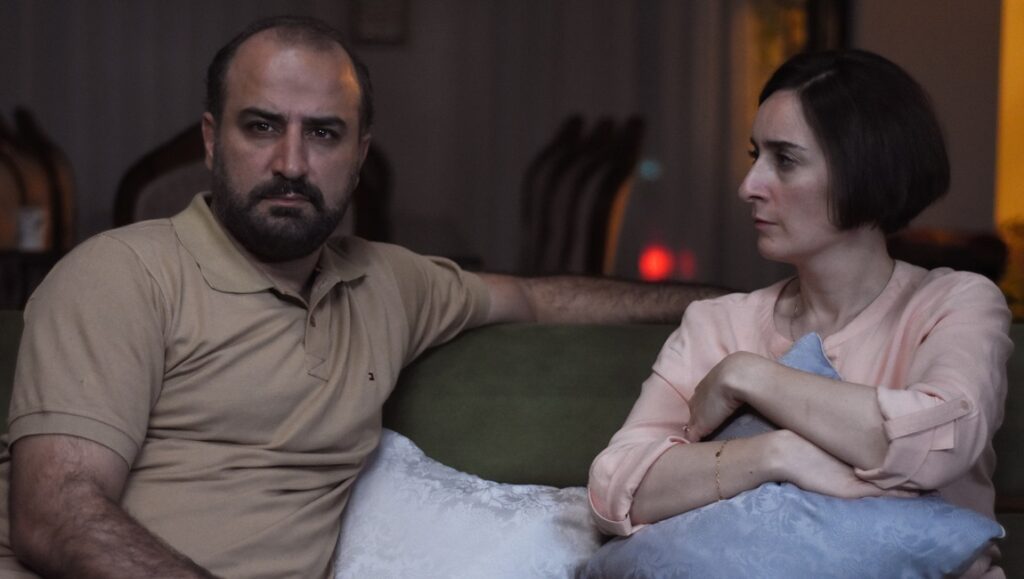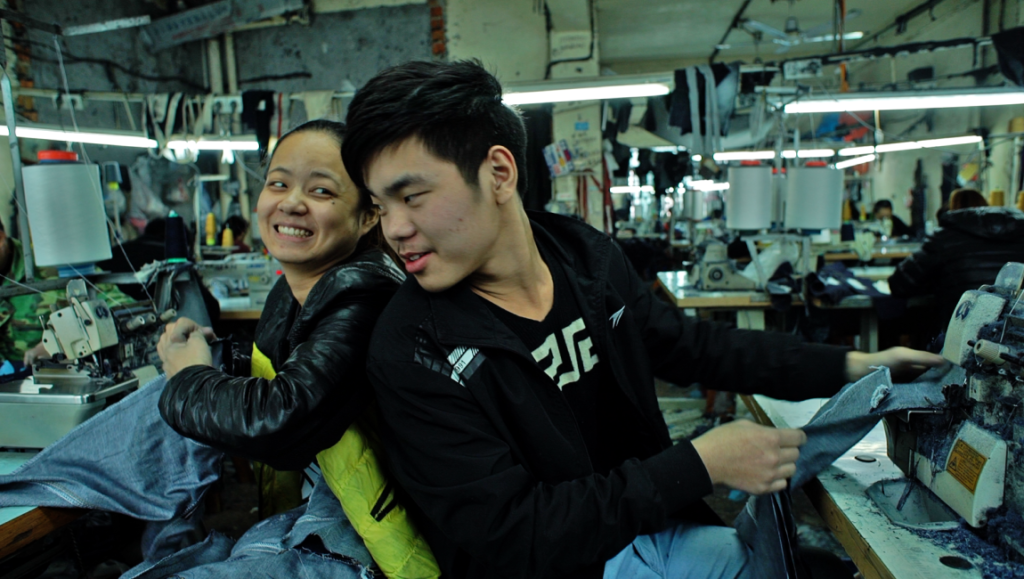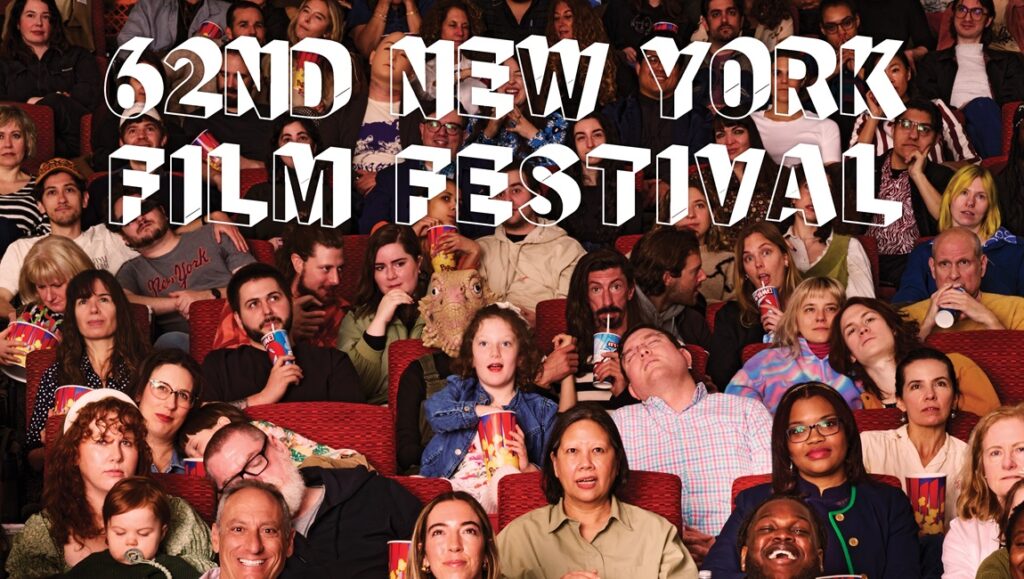All We Imagine As Light
“This city takes time away from you,” says one of the seven disembodied voices introducing us to the wide-awake-at-night Mumbai city in the lyrical opening montage of Payal Kapadia’s All We Imagine as Light. Clément Pinteaux’s jump-cut editing and Ranabir Das’ mobile camerawork enhance this feeling of poetic chaos: we’re always on the move, stumbling into overcrowded streets when not uncomfortably sat inside overcrowded trains and buses, our eyes, like the kinoeye, constantly looking for someone else who’s also grinding it out in the sticky heat of the night. And then, all of a sudden, the film slows down… [Previously Published Full Review.] — DHRUV GOYAL
Anora
The title character of Sean Baker’s Anora notably does not go by that name for most of the film, and appears uncomfortable when male characters tell her how pretty her birth name is. In fact, Mikey Madison’s character prefers to be called Ani, and it plays into the dominant theme of the film, which is how we define ourselves in relation to how others do. Ani is a young exotic dancer working out of a club in Brooklyn not far from the Russian enclave of Brighton Beach. Ani’s gregarious and fast-talking, a hustler if you will; it’s a topless club but she knows if she brings the right kind of big spender back to the private room she can get away with dropping her bottoms as well… [Previously Published Full Review.] — ANDREW DIGNAN

The Ballad of Suzanne Cesaire
Madeleine Hunt-Ehrlich’s new film can only be described as experimental. It doesn’t just explore the legacy of Martinican writer Suzanne Roussi-Césaire, an intellectual whose ideas and achievements have largely been eclipsed by those of her husband, post-colonial poet and theorist Aimé Césaire. The Ballad of Suzanne Césaire is also a meta-filmic commentary on the process of reconstructing history’s incomplete record. Hunt-Ehrlich frequently breaks the frame, showing us the process by which she and her actors are constructing 1930s Martinique with limited cinematic means… [Previously Published Full Review.] — MICHAEL SICINSKI
bluish
The depictions of early adulthood in cinema have, until recently, been characterized by an odd, dizzying sensation: portraying it as a period where one’s life has never been, and would never again be, so far from being a perfectly orchestrated and coherent course of growth — a sensation similar to those moments in cartoons when a character sprints off in haste, losing themselves in the momentum of exhilaration and freedom, only to realize mid-air that they’re off the cliff and about to be devoured by the void. The manic and messy adventures of 20-somethings from the aughts and early 2010s, mostly championed by American indies and with GIFs that decorated Tumblr and Pinterest feeds, are now being turned into running gags on TikTok to satisfy the ever-growing nostalgia of millennials… [Previously Published Full Review.] — ÖYKÜ SOFUOĞLU
By the Stream
In “The Evolution of the Language of Cinema,” André Bazin famously argued that depth-of-field marked a dialectical leap forward in the development of the artform. His argument involved two principal points. On the one hand, there was a “psychological” point: the use of depth of field, as in the films of Welles and Wyler, created a relationship between the viewer and the image, which was purportedly closer to “reality.” Unlike the “analytical editing” of a prior era, in which isolated fragments of a scene are ordered for the viewer, the “meaning” of a depth-of-field shot in Citizen Kane (1941), say, depends in part on the viewer’s active distribution of attention… [Previously Published Full Review.] — LAWRENCE GARCIA

Dahomey
Before making her feature film debut with 2019’s Atlantics, French-Senegalese director Mati Diop produced a series of poetic short films, all of which explored a different oblique angle on the legacy of colonialism. Some, like A Thousand Suns (2013), consider the role of filmmaking in defining and communicating the anti-colonial struggle. That film focused on the actor Magaye Niang, star of Touki-Bouki, directed by Diop’s late uncle, Djibril Diop Mambéty. Others, like the short-film version of Atlantiques (2009), explore the false promises of immigration for poor men in Senegal, for whom Europe is a dream that, siren-like, lures them to their deaths… [Previously Published Full Review.] — MICHAEL SICINSKI
The Damned
Across five feature films to date, most of which exist within a liminal space located between fiction and documentary narrative, demarcated with blurred lines, Roberto Minervini has engendered a number of comparisons. Sean Baker comes to mind if one is to look primarily at the subjects and subject matter that seem to preoccupy the Italian director’s mind, while Carlos Reygadas feels very much alive in Minervini’s ability to capture a place and a people divorced from our notions of modern living. The director’s latest, The Damned, which concerns a group of volunteer Union soldiers tasked during the Civil War with a patrol post in the western territories, foregoes the director’s usual mode of documenting off-kilter modernity and so at first glance offers something of a superficial pivot from the considerations that permeate his previous work… [Previously Published Full Review.] — LUKE GORHAM
DIRECT ACTION
DIRECT ACTION, co-directed by Guillaume Cailleau & Ben Russell, traces the outer contours and inner lives of the persons within the ZAD de Notre-Dame-des-Landes (the Zone to Defend). The area in Western France has been home to an autonomous zone in opposition to planned construction of an airport, with both local farmers and environmental activists taking part in defying attempts to evict them. The first occupation was in 2007, and over a decade of work and pressure resulted in the airport project being abandoned in 2018. Cailleau and Russell pick up in 2022-2023, where a very different challenge is being posed to the community… [Previously Published Full Review.] — JOSHUA PEINADO

Emilia Pérez
Just shy of 10 years after winning an ill-deserved Palme d’Or for Dheepan (2015) — a leering intrusion into the lives of a makeshift Sri Lankan family, shunted mercilessly from one violent situation to the next — French director Jacques Audiard returned to the Croisette with his latest exercise in cultural tourism. The Mexico-set Emilia Pérez, which walked away with the fest’s Jury Prize and a Best Actress award for its ensemble cast, has been billed as a telenovela-gangster-musical about a cartel boss who fakes her own death in order to transition to womanhood… [Previously Published Full Review.] — ALEXANDER MOONEY
Grand Tour
Like his 2012 masterpiece Tabu, Miguel Gomes’ Grand Tour uses the transition from the silent to the sound era to explore the passage into a post-colonial situation, employing deliberate anachronisms to undercut the imperialist — and in this case Orientalist — trappings of empire. Nominally set in 1917, the film opens in Rangoon, where Edward (Gonçalo Waddington), a British civil servant, is awaiting his fiancée Molly (Crista Alfaiate), who is set to arrive in the Burmese capital after a long-term engagement… [Previously Published Full Review.] — LAWRENCE GARCIA
Lazaro at Night
Medium-length features; a small but consistent troupe of actors in every picture; every scene just another conversation; little-to-no camera movement; and beguiling, inventive narrative structures that make otherwise simple movies anything but — these are the artistic hallmarks that have granted director Hong Sang-soo a well-deserved cult following. But all of those characteristics also describe the oeuvre of lesser-known Nicolás Pereda, who, if it can be believed, makes even quieter, slower works than Hong… [Previously Published Full Review.] — ZACH LEWIS

Misericordia
Alain Guiraudie’s Misericordia begins, as so many stories do, with a homecoming. When first introduced, 30-something Jérémie (Félix Kysyl) is driving to his rural hometown of Saint-Martial, from which he has been away for some ten years, for the funeral of his former boss. Upon arrival, he briefly reconnects with the man’s widow, Martine (Catherine Frot), and his son Vincent (Jean-Baptiste Durand), a childhood friend. For the moment, though, the funeral proceedings take over… [Previously Published Full Review.] — LAWRENCE GARCIA
Oh, Canada
The title gives it away. Before one even begins watching Paul Schrader’s latest, the tone is effectively set by a little writerly in-joke of changing the title of Canada’s national anthem from the holy “O” (or the Québécois “Ô”) of direct address, best reserved for the Lord in King James’s English, to the exasperated interjection of “Oh,” followed by a comma lest disappointment be misread as astonishment. Yes, Oh, Canada is about a series of disappointments, though it can also be about making peace with those disappointments — the familial “oh” as in the “oh, you!” uttered when a loved one’s forgivable eccentricities appear… [Previously Published Full Review.] — ZACH LEWIS
Pepe
Just barely after the advent of photography, the concept of putting a camera in a balloon was born. Taken long before commercial air travel, these photographs of Paris taken by balloonist Nadar gave the world the perspective of birds and God for the first time. There are very few times in history that the world’s people could be said to be given an entirely different viewpoint on the world, but wonder and elation would soon become the humdrum of efficiency as farmers and landowners used this new technology to monitor crops and enforce borders. And, of course, no story of wondrous moments would be complete without military intelligence taking God’s powers for Old Testament-style punishment and surveillance… [Previously Published Full Review.] — ZACH LEWIS

The Seed of the Sacred Fig
As titles go, the latest from Iranian filmmaker Mohammad Rasoulof epitomizes a rare fidelity to its subject. The Seed of the Sacred Fig, quite possibly the director’s pièce de résistance in an oeuvre long conversant with everyday Iranian life and critical of the Islamist regime under which it unfolds, brims with the germs of many ideas and sows them far and wide over a sprawling runtime. There is a sacredness, too, attached to its proceedings: a film incensed by the scales of injustice and insistent on invoking morality against morality’s own weaponization, Rasoulof’s indictment of his country’s theocratic regime comes hot off the heels of a renewed prison sentence from which he narrowly escaped, along with footage from a production clandestinely made and then smuggled across the border… [Previously Published Full Review.] — MORRIS YANG
7 Walks with Mark Brown
Pierre Creton and Vincent Barré have amassed a remarkable body of work, and “body” is certainly an apt descriptor. Their intimate and playful films are concerned with social interactions and the world surrounding them; last year in Cannes’ Directors’ Fortnight, Creton premiered Un Prince, which seemed like a summation of all these ideas: a years-long portrait of a young botanist, his romantic bonds, and his artistic blossoming… [Previously Published Full Review.] — CHRIS CASSINGHAM
Transamazonia
The most emotionally and spiritually invigorating faith-based films rely not on proselytization or condemnation, but on abstraction. Their dramatic force comes from their characters’ tormented search for meaning in a sea (or forest) of contradictory meaning and meaninglessness; clear-eyed realization (or rejection) of faith minus this emotional and spiritual struggle is akin to achieving enlightenment without introspection. Where’s catharsis (or despair) in that… [Previously Published Full Review.] — DHRUV GOYAL

Universal Language
Universal Language opens on a static wide shot outside a French language school in snowy Winnipeg. We see the teacher grumpily trudge in late. Once inside, he proceeds to take out his anger on the young Persian students, telling them candidly they won’t ever amount to anything. This scene directly recalls Kiarostami’s Where Is the Friend’s House?, but also draws to mind the more recent, similarly snowbound About Dry Grasses, in which teacher Samet (Deniz Celiloğlu) angrily tells his students they’ll never be anything but sheep farmers… [Previously Published Full Review.] — CALEB HAMMOND
You Burn Me
Matías Piñeiro is best known for loosely adapting Shakespearean texts via small-scaled, interpersonal dramas: Twelfth Night in Viola; Measure for Measure in Isabella; Love’s Labour’s Lost in The Princess of France; The Tempest in Sycorax. Of course, these are not straightforward adaptations, and Piñeiro uses these plays instead as loose frameworks to hang his own explorations of romance and drama on, allowing his creations to intermingle with and embody the texts in various ways… [Previously Published Full Review.] — DANIEL GORMAN

Youth (Hard Times)
Wang Bing films have a reputation for their difficulty, but the opening film in his Youth trilogy, Youth (Spring), managed to be surprisingly varied and enjoyable despite consisting of 212 minutes of Chinese sweatshop workers struggling to get by. It was frequently exuberant and vivacious, a movie about young people flirting and arguing and having fun with one another despite the clear dreadfulness of their surroundings… [Previously Published Full Review.] — ANDREW REICHEL
Youth (Homecoming)
Analyzing a Wang Bing is never such a small feat, regardless of length; and Youth (Homecoming), the final entry in the director’s Youth trilogy, premiering at Venice following similar premieres for Hard Times (225 mins) and Spring (212 mins) at Locarno 2024 and Cannes 2023 respectively, is little different despite its comparatively brief 150-minute runtime. The nature of the task of criticism here is due in part to the reality that the viewer can now bring to bear something of an anatomical analysis of this latest documentary series from one of filmmaking’s most intractably principled and resolutely patient directors… [Previously Published Full Review.] — MATT MCCRACKEN


Comments are closed.